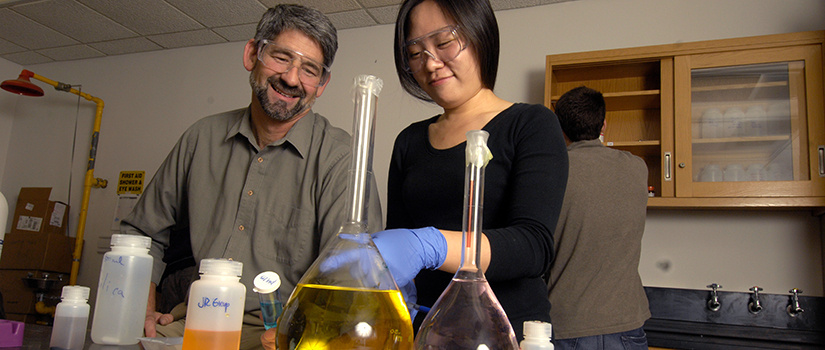More efficient catalyst conversion will aid development of pharmaceuticals and green chemicals
By Leigh Thomas | April 10, 2020
John Regalbuto, professor of chemical engineering in the College of Engineering and Computing, has received a $500,000 grant from the National Science Foundation to continue research that could impact the development of some medicines, such as vaccines. The research is being conducted by the Center for Rational Catalyst Synthesis (CeRCaS), which seeks to streamline catalyst development to make it more efficient for a number of industries.
Regalbuto is the director of CeRCaS, the world’s first and only research center focused on understanding the chemical fundamentals of catalyst synthesis. Catalysis is a hidden but high-impact science at the heart of the energy, chemical and environmental industries. Catalysts are perhaps best known in automobile catalytic converters, but the same types of catalytic processes are responsible for the production of gasoline, textiles, fertilizer and pharmaceuticals.
Phase I of this study, which combined expertise from UofSC and Virginia Commonwealth University (VCU), concluded on March 31. Phase II began April 1 with additional research site planned at University of California at Berkeley/University of California at Davis.
Frank Gupton is professor and chair of the Chemical and Life Science Engineering Department. In addition to directing the VCU site of CeRCaS, he also directs the Medicines For All Institute (M4ALL). With a $25 million sponsorship from the Gates Foundation, M4ALL is charged with making inexpensive drugs for third world countries for treatment of infectious diseases, such as malaria.
Part of the process in developing new medicines is developing a catalyst to perform a critical hydrogenation reaction. “This can be a painstaking trial and error process,” Regalbuto explains. The goal of CeRCas is to improve the science of catalyst preparation to develop hydrogenation catalysts, among others, more quickly and in turn help pharmaceutical companies develop medicines at a more rapid pace.
CeRCaS is impacting the energy industry as well, by studying catalyst preparations for alternate energy sources such as the conversion of biomass into the components of green gasoline, diesel and jet fuel. Improving the science of catalyst preparation will help companies convert biomass into green chemicals more efficiently.
Regalbuto estimates that about one-third of the world’s economy depends directly or indirectly on catalysis. He said, “Our research will save tremendous amounts of time and energy in the development of new catalysts for petroleum, chemical and pharmaceutical companies as well as catalyst manufacturers. Optimized catalysts allow chemical conversions to be achieved in the most efficient, economical and environmentally responsible manner, reducing raw material usage, energy requirements and greenhouse gas emissions.”
The National Science Foundation also granted $500,000 to VCU. With the impending addition of a site at UC Berkeley/UC Davis and a number of industry partners also involved, such as ExxonMobil, BASF, UOP, Biogen, Chevron, Mitsubishi, Fuzionaire, Savannah River National Lab and Idaho National Lab, the total funding for Phase II is expected to exceed $5 million. Each phase has a duration of five years.
